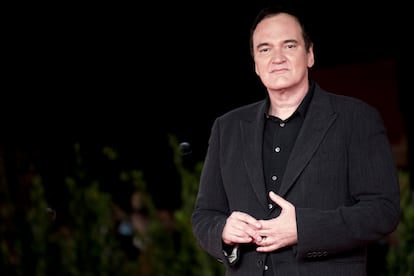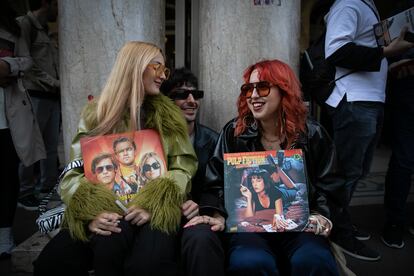Quentin Tarantino: ‘I own a gun and I’ve kept the swords from ‘Kill Bill’ '
The director of ‘Pulp Fiction’ spoke with EL PAÍS about the gun control debate in the United States and his love of Spanish cinema, among other subjects. He also acknowledged that he has a natural talent to create tension on-screen


Quentin Tarantino doesn’t smell of gunpowder. If he has the scent of anything, it’s of triumph. He certainly had it after he spoke to 1,500 enthusiastic fans about his book — Film Meditations — in Barcelona last Sunday. His European tour will soon conclude in Berlin. After celebrating how well the evening went at Barcelona’s Coliseum Theater by spending the night at a bar, the 60-year-old filmmaker receives EL PAÍS at his hotel for an interview. He appears somewhat tired, but satisfied. His presence — with that strong face, marked by iconic features — is imposing. After all, Tarantino, who was born in Knoxville, Tennessee, is a man who has filmed some of the most striking scenes in modern cinema, with many of the world’s most popular actors.
Question. How was yesterday’s experience?
Answer. A lot of fun! Were you there? Yes? Did you like it? I’m so glad. I loved it!
Q. You worried all of us when you said that your next movie will be your last feature film. Will you really not make any more movies?
A. That’s the intention.
Q. Won’t you make a science fiction movie? It’s the one genre that you’re missing, even though you like it a lot.
A. Possibly not. But let’s let a little time pass…
Q. Do you have a good katana? I mean, a samurai sword.
A. I do, yes! I kept the swords from Kill Bill.
Q. So you have the Hattori Hanzo swords? Wow!
A. Ha ha ha, yes.
Q. In your book, when you talk about Steve McQueen — whom you praise a lot, especially for his work in Bullitt and The Great Escape — you say that he loved to read car magazines, and that he was always thinking about what weapons his characters would carry.
A. Yes, he was a weapons expert. Choosing the right weapon is very important in an action movie.
Q. What do you prefer: a katana, a .44 Magnum, a sawed-off shotgun, a Gatlin machine gun, or a flamethrower?
A. In general, in modern cinema, when I have to choose a weapon, I use a 9 mm [pistol], because it looks like a .45 automatic pistol, but it doesn’t jam.
Q. What do you think of Alec Baldwin’s accident on the set of Rust that cost Halyna Hutchins her life?
A. What a tragedy. I don’t know how it could have happened. On set, there are lots of security measures… we’re very careful.
Q. What’s your position on the debate about gun ownership in the U.S.?
A. There are always two sides. We certainly don’t need as many automatic weapons as there are. There should be better laws. [But] I do have a gun at home.
Q. A gun?
A. Yes, for protection.
Q. A few years ago in an interview, the father of Uma Thurman — a promoter of Tibetan Buddhism in the U.S., a friend of the Dalai Lama and a former monk — defended his cinematic work. He told me that we must distinguish between real violence and on-screen violence.
A. Robert [Thurman], yes. I couldn’t have said it better myself. There is no real violence in the movies. We’re just playing.
Q. Are you tired of the debate about violence in your movies?
A. Yes, very much so. In fact, I hope you stop asking about it, ha ha!
Q. But, in your book, you write about the unbearable violence of Bambi… about how much it disturbed you. Yesterday, your thoughts about it made big headlines in Spain.
A. Bambi… horrible. And when I said it, the audience reacted by showing that they knew exactly what I was talking about. Much of my generation was very traumatized by the film. Everyone remembers it.
Q. Maybe you identify more with Thumper (the rabbit in Bambi), because of the barrel of a revolver!
A. You keep emphasizing that, ha ha.
Q. You talk a lot about the film Deliverance (1972) by John Boorman, where one of the leading men is raped.
A. The analysis of that film is one of my favorite parts of my book.
Q. Your summary of it — “what happens in the forest stays in the forest” — is great. Some of us who saw the film were also young — although not as young as you — when we were introduced to archery by the character played by Burt Reynolds.
A. How interesting. Maybe you got over the [shock of the film] because of that.

Q. How did you come up with the idea of killing Hitler in Inglourious Basterds?
A. Good question. I was writing the script and I got stuck. I was thinking: “Okay, it looks like the bastards and the resistance [fighters] are going to achieve their goal… now what?” I didn’t know how to go on and no idea came to me. So, I thought, “What if I just screw Hitler and I kill him?” I asked myself: “Can I do it?” And I answered: “Sure, it’s my movie, I can do whatever I want.” Then I wrote the idea down on a piece of paper and, seeing it the next morning, I decided.
Q. Apart from the fact that you rewrite the history of Hitler by making him die in a French movie theater in a dramatic, bloody style — instead of committing suicide in the Führerbunker in Berlin — you had a very good actor playing the role: Martin Wuttke.
A. Without a doubt, he’s a great Hitler. Even with a cape.
Q. How do you achieve the climate of tension in those sequences of yours that are so characteristic, such as the one in the tavern in Inglourious Basterds, which ends with everyone getting shot?
A. I don’t know how to explain it. I have a talent for it. It’s easy for me to create those situations where the characters start talking and things fall into place and there’s a climax. You throw a ball to the actors and they catch it.
Q. What’s your favorite tense moment?
A. In my movies? The one from the farm at the beginning of Inglourious Basterds. With the Nazi officer Hans Landa talking to the owner of the farm, who is hiding Jews in his cellar.
Q. And the tense sequence with the strudel and the whipped cream from the same film?
A. Ha ha ha, that one too.
Q. Humor plays an important role in your creation. An unforgettable moment in that regard is that of the pathetic Klu Klux Klan horsemen in Django Unchained. Was the sequence involving the riders improvised?
A. Not at all, the entire dialogue is written in the script, from beginning to end. The goal was to make it look very fresh.
Q. In your films, there are two legendary moments of dance. The one with the twist from Pulp Fiction and the one with Mr. Blonde dancing in Reservoir Dogs. Do you have a special interest in dance?
A. A dance sequence can work very well in a movie… but the two cases you mention are very different. The one with Reservoir Dogs is strange, a torture dance, while the one with John and Uma [in Pulp Fiction] is a real dance. And then there was John Travolta!
Q. In the book, you express your admiration for Spanish cinema. Your assessment of Matador, however, is somewhat surprising, since it has never been considered as one of Pedro Almodóvar’s best films.
A. I’m not saying it’s the best movie, but I like it a lot. Talking last night at the bar, we remembered that Orson Welles also liked Matador. What surprised us in the 1980s in the U.S. — when cinema was so timid — were scenes as brave as the one of Almodóvar’s ex-matador masturbating to slasher movies.
Q. In your book, you quote widely from Summertime Killer (1972), by Spanish director Antonio Isasi-Isasmendi.
A. I’m a fan of Isasi. And that movie is a revenge-themed genre, which I talk about a lot. [The actor] Christopher Mitchum was great in that.
Q. He was riding an Ossa Enduro — a very popular all-terrain motorcycle at the time.
A. Did it become famous because of the movie?
Q. It was already a legendary motorcycle in Spain. Tell me, what’s your relationship like with streaming platforms?
A. I don’t watch Netflix. I stick with DVDs.
Q. Is your personal heaven the old video store in Manhattan, where you once worked as a clerk?
A. Yes, when they closed, I bought all their inventory. I didn’t want to lose it. I have the entire collection.
Q. Are actors very special creatures?
A. Yes, they are. I’ve always gotten along with them, we have a great time together. My job is to bring out the best in them. I always tell [my actors] that I hope they think that, after working with me, their next movie is crap! Let them say to themselves, “I was so good in that last movie I did with Tarantino.”
Q. Your enthusiasm for Rocky is somewhat surprising…
A. I think I saw it at the ideal age, when I was 13. Sylvester Stallone is a really good actor.
Q. First Blood (1982) — starring Sylvester Stallone — was far worse than the novel by David Morrell that it was based on, don’t you think?
A. That’s true. I really like Morrell and I read the novel before [watching the movie]. I like Stallone… but the character of Rambo is much better in the book.
Sign up for our weekly newsletter to get more English-language news coverage from EL PAÍS USA Edition
Tu suscripción se está usando en otro dispositivo
¿Quieres añadir otro usuario a tu suscripción?
Si continúas leyendo en este dispositivo, no se podrá leer en el otro.
FlechaTu suscripción se está usando en otro dispositivo y solo puedes acceder a EL PAÍS desde un dispositivo a la vez.
Si quieres compartir tu cuenta, cambia tu suscripción a la modalidad Premium, así podrás añadir otro usuario. Cada uno accederá con su propia cuenta de email, lo que os permitirá personalizar vuestra experiencia en EL PAÍS.
¿Tienes una suscripción de empresa? Accede aquí para contratar más cuentas.
En el caso de no saber quién está usando tu cuenta, te recomendamos cambiar tu contraseña aquí.
Si decides continuar compartiendo tu cuenta, este mensaje se mostrará en tu dispositivo y en el de la otra persona que está usando tu cuenta de forma indefinida, afectando a tu experiencia de lectura. Puedes consultar aquí los términos y condiciones de la suscripción digital.








































